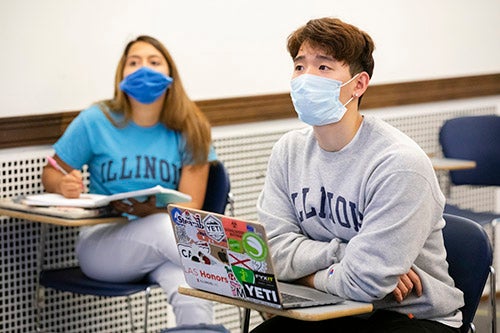 Class schedules in the Fall 2020 semester will look different for many students across the College of LAS, whether that includes in-person courses allowing for adequate social distancing or lectures being held online. However, one thing will always remain the same: quality instruction from some of the nation's top educators in hundreds of courses covering all sorts of interests.
Class schedules in the Fall 2020 semester will look different for many students across the College of LAS, whether that includes in-person courses allowing for adequate social distancing or lectures being held online. However, one thing will always remain the same: quality instruction from some of the nation's top educators in hundreds of courses covering all sorts of interests.
We asked LAS students and professors about the courses they’re excited to take and teach this fall. From the history of our universe to current culture and everything in-between, in-person courses to online instruction, here’s what they said.
Game of Thrones (GER 199)
Description: This course will introduce cornerstones of the classical and modern theory of sovereignty and theories of violence in the context of G.R.R. Martin’s popular novels as well as the TV series.
“I have loved the Game of Thrones television series for years now and I am extremely excited to see what resources Professor Hunt will connect to GOT since I am already very familiar with it and would love to delve into it more by applying it to modern society!” – Kendall Robbins
Environmental Writing (ESE 360)
Description: This course equips students to write about the environment for various audiences, with a focus on specific current efforts to promote sustainability on the Urbana-Champaign campus.
“I’m working towards a career in environmental sustainability, which is something I care deeply about, and I believe that it’s critical to be able to express the knowledge I have acquired in a professional matter with good writing technique.” – Xanthe Huspen
Politics and the Media (PS 312)
Description: This course examines the processes of mass-mediated political communication in democratic societies.
“Fall semesters in presidential election years are always exciting times to teach Politics and the Media, but this fall I’m even more excited than usual. I've been teaching this class in various forms for 24 years and have long been wanting to "flip" the course so that scheduled class time could be reserved for small group discussions and active learning exercises. And that is what we're going to do this fall. I aim to make this course the favorite course of the semester for at least half of enrolled students, and I will be measuring progress toward that goal as the semester moves forward.” – Professor Scott Althaus (Course instructor)
Philosophical Foundations of Computer Science (PHIL 222)
Description: This course will take students to a journey through conceptual ideas that underlie the intersection of philosophy and computer science, from the origin of computer science to its current frontiers.
“Computer science is the product of many ancient philosophical inquiries; many modern problems in computer science are problems which philosophers have wrestled with for thousands of years. Studying philosophy in tandem with computer science often reveals these connections and origins in interesting but indirect ways, so I am looking forward to a specialized course which explores and addresses those relationships more directly.” – Adam Chibe
A History of Everything: The Big Bang to Big Data (HIST 103)
Description: This introductory survey in "Big History" explores different scales of time as it places human history in larger geological, ecological, and cosmic contexts.
“This is one of the most exciting courses I've ever designed and taught, since it asks us to think historically about the history of the entire universe—and our place in it—in a single semester! Students will learn about everything from the Big Bang to the extinction of the dinosaurs to the rise of capitalism, and more importantly, about how scientists and scholars reconstruct past events on very different timescales.” – Professor David Sepkoski (Course instructor)
Interviewing: The Art & Science of Effective Questioning (CMN 215)
Description: Questioning is fundamental to human communication. The process for questioning in a structured, purposeful way is called interviewing, which is both an art and a social science.
“I am looking forward to taking CMN 215 because I think it offers unique material. On one hand, we will be learning about how to conduct a proper interview and how the formation of a question can make you stand out as an interviewer as well as make your interviewee's answer stand out. On the other hand, I expect to learn material that will prepare me for future job interviews and allow me to set myself apart from other candidates. I can see this class giving me the skills to feel more confident when I enter the job market in the future.” - Colette Lancaster
Hip Hop Music: History and Culture (AFRO 228)
Description: This course shows how musicians and listeners use hip-hop to express ideas about topics such as economics, nationalism, black power, feminism, and violence.
“Students are very enthusiastic about hip-hop, but they often come into class without much knowledge of the genre's history or its connections to political and social changes. In this class, we get to analyze the music itself and its links to the world around it.” – Professor John Paul Meyers (Course instructor)